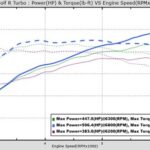The MK6 GTI, a popular hot hatch, has a reputation for both performance and potential reliability issues. While not inherently unreliable, certain problems can arise, especially with higher mileage and improper maintenance. This article explores common MK6 GTI problems and offers advice on identifying and mitigating them.
Common MK6 GTI Issues
Several issues plague the MK6 GTI, often stemming from aggressive driving and neglected maintenance. Here are some of the most prevalent problems:
Timing Chain Tensioner Failure
Perhaps the most severe issue is timing chain tensioner failure. This component is crucial for engine timing, and its failure can lead to catastrophic engine damage. Volkswagen addressed this issue with a revised part in 2013+ models. When inspecting a pre-2013 MK6 GTI, pay close attention to any rattling noises from the engine, which could indicate a failing tensioner.
Wastegate Rattle
Another common problem is a rattling noise from the turbocharger’s wastegate. This can indicate wear and tear and may require replacement or repair. While not as catastrophic as timing chain failure, it can still lead to performance issues and costly repairs.
Carbon Buildup
Direct injection engines, like the one in the MK6 GTI, are prone to carbon buildup on the intake valves. This buildup can affect performance and fuel economy. Regular cleaning using specialized methods like walnut blasting can prevent this issue.
Other Potential Problems
Other potential issues include:
- Rear Main Seal Failure: This can lead to oil leaks.
- Water Pump Failure: A failing water pump can cause overheating.
- High-Pressure Fuel Pump Failure: This can result in starting problems and poor performance.
- Intake Manifold Flap Position Sensor Issues: This sensor can malfunction, leading to various engine codes and drivability issues.
General High-Mileage Concerns
Like any high-mileage car, the MK6 GTI can experience issues such as:
- Oil Leaks: Various seals and gaskets can wear out over time, leading to oil leaks.
- Coil Pack Issues: Faulty coil packs can cause misfires and rough running.
- Injector Problems: Clogged or failing fuel injectors can also contribute to poor performance.
- PCV Valve Failure: A faulty PCV valve can lead to excessive oil consumption and other problems.
Inspecting the engine bay for leaks and other signs of trouble is crucial when buying a used MK6 GTI.
Buying a Used MK6 GTI: A Checklist
If you’re considering buying a used MK6 GTI, a thorough inspection is essential. Here’s a checklist to help you:
- Use a Scan Tool: Check for any stored fault codes.
- Inspect for Leaks: Look for oil or coolant leaks in the engine bay and underneath the car.
- Check for Rust: Inspect for rust, especially around the fenders and doors.
- Test the AC: Ensure the air conditioning system is functioning correctly.
- Inspect Axle Boots: Look for grease around the axle boots, indicating potential wear.
- Check the Oil: Examine the oil for cleanliness and signs of sludge.
- Check the Coolant: Ensure the coolant reservoir is full.
- Listen for Unusual Noises: Listen for any unusual noises, such as a high-pitched whine from wheel bearings.
- Check Service History: Use a service like Carfax to check the vehicle’s maintenance history.
Checking the undercarriage for rust, leaks, and other issues is an important part of inspecting a used MK6 GTI.
Conclusion
The MK6 GTI can be a reliable and enjoyable car with proper maintenance and careful inspection. By understanding the potential problem areas and performing thorough checks before purchasing, you can increase your chances of owning a trouble-free MK6 GTI. Remember, a pre-purchase inspection by a qualified mechanic is always recommended.

